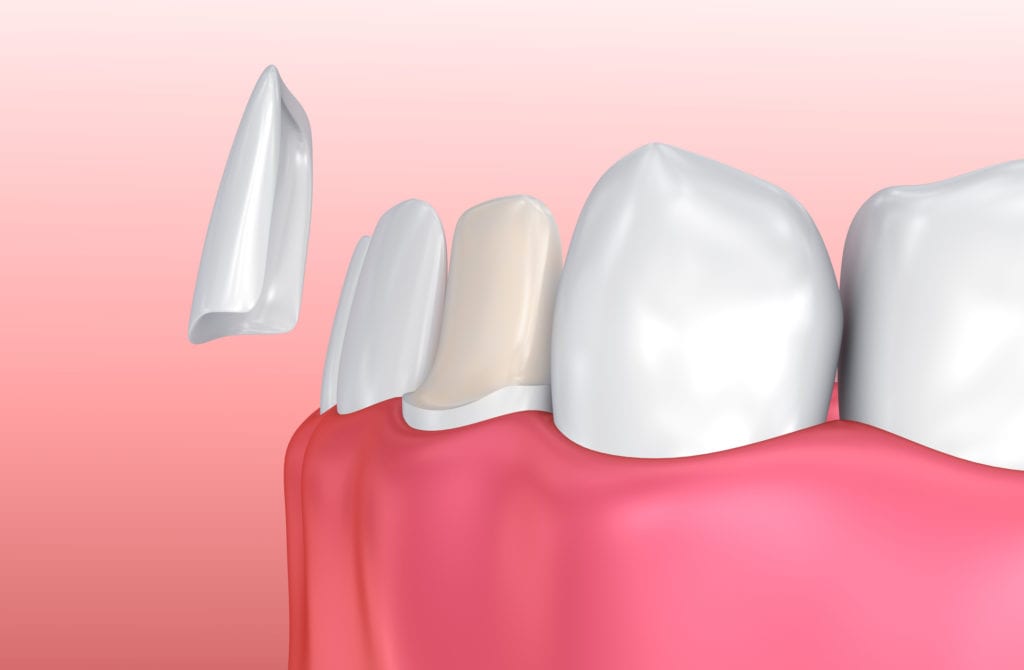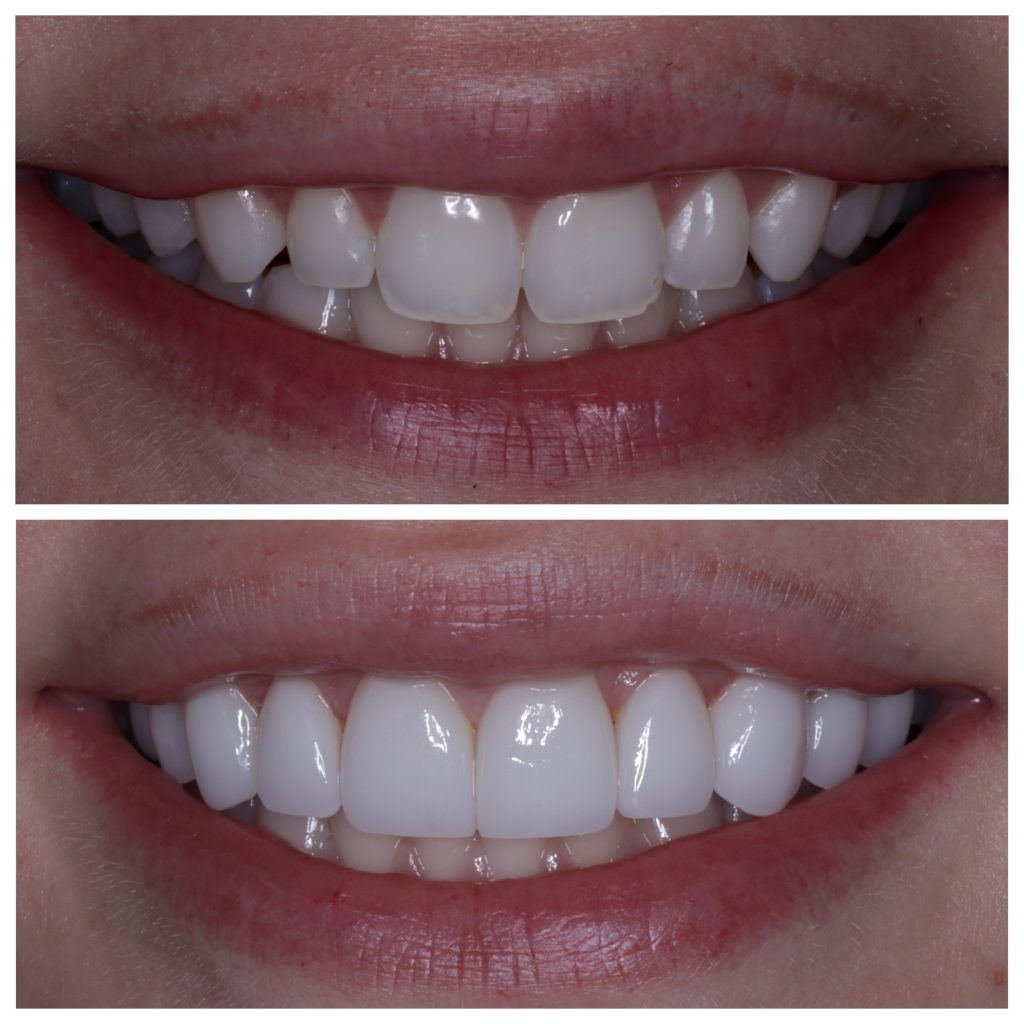Understanding Veneers Teeth Options for a Brighter, Confident Smile
Unlocking the Secrets of Veneers: Facts, Kinds, and Benefits for a Gorgeous Smile
Veneers use an engaging solution for those seeking to improve their smiles. These oral improvements can resolve different blemishes, from discoloration to imbalance. With options like porcelain and composite, people can choose based on their choices and requirements. Understanding the subtleties of veneers, consisting of application and treatment, is necessary. What aspects should one take into consideration before deciding? The responses might amaze those interested in this aesthetic dental choice.

Comprehending Veneers: What Are They?
Veneers are thin, personalized shells made to cover the front surface area of teeth, enhancing their look. Generally crafted from resilient materials, these coverings are tailored to fit each individual's teeth exactly. They serve numerous purposes, consisting of dealing with visual flaws such as staining, chips, or voids. The application process involves a dental expert preparing the teeth, usually by getting rid of a tiny quantity of enamel to guarantee a snug fit. Once prepared, the veneers are bonded to the teeth using a solid adhesive.
Individuals frequently choose veneers for their capacity to produce a natural-looking smile while providing a durable solution to oral imperfections. Unlike other aesthetic dental care choices, veneers require minimal invasive procedures, making them a prominent choice. The outcome is an enhanced smile that can considerably boost an individual's self-confidence and self-esteem. Generally, veneers supply a reliable technique to accomplishing a more harmonious and appealing dental appearance.
Sorts of Veneers: Porcelain vs. Composite
When thinking about aesthetic dental alternatives, 2 key kinds of veneers stand apart: porcelain and composite. Porcelain veneers are crafted from a durable ceramic material that resembles the natural look of teeth. They are recognized for their stain resistance and capability to mirror light similarly to natural enamel, supplying a visual allure that several clients need. The application process usually entails even more preparation of the tooth framework and might require numerous visits to the dental expert.
On the other hand, composite veneers are made from a tooth-colored resin that is directly put on the teeth. This kind enables quicker application and can often be completed in a solitary visit. While they are cheaper than porcelain veneers, they may not provide the very same longevity or resistance to staining. Ultimately, the choice in between porcelain and composite veneers depends on private preferences, budget, and particular oral requirements.
The Advantages of Deciding On Veneers
Picking veneers uses various advantages that can considerably improve both the aesthetic appeals and performance of a person's smile. One of the main advantages is their capability to correct flaws such as staining, spaces, and misalignment, leading to an extra uniform appearance. Veneers can likewise improve the durability of teeth, providing a safety layer that guards them from damage.
They require very little tooth preparation compared to other oral treatments, maintaining even more of the natural tooth structure. This preservation adds to a much healthier oral atmosphere while still attaining a magnificent smile.
Veneers are highly personalized, permitting individuals to pick the form, dimension, and shade that best matches their preferences. In addition, they are stain-resistant, making it less complicated to keep a appealing and brilliant smile over time. On the whole, veneers provide a reliable option for those looking for both aesthetic improvement and long-term oral wellness advantages.
The Veneer Application Refine
The veneer application procedure entails a number of essential actions to ensure suitable results. At first, an appointment is carried out to evaluate the patient's demands, adhered to by the prep work and shaping of the teeth. Finally, the veneers are bonded in location, with adjustments produced an excellent fit and look.
Initial Examination Tips
A thorough preliminary appointment is crucial for any person thinking about veneers, as it sets the foundation for an effective treatment. Throughout this meeting, the oral expert assesses the person's dental health and wellness, going over any existing concerns that could influence the veneer application. This evaluation may consist of X-rays and an aesthetic examination to identify the problem of the teeth and gum tissues.
The dental practitioner likewise engages the person in a detailed discussion concerning their visual objectives, choices, and expectations. They might present numerous veneer options tailored to the person's specific requirements. Furthermore, the expert clarifies the treatment, prospective risks, and aftercare needs, making sure that the person is well-informed and comfortable prior to continuing with the therapy.
Prep Work and Forming Teeth
After the first assessment, the following stage includes the preparation and shaping of the teeth to suit the veneers. This crucial action is done by the dental professional, that meticulously evaluates the tooth structure to figure out the Full Article quantity of enamel that requires to be eliminated. Typically, a slim layer, usually around 0.5 millimeters, is cut off to assure a proper suitable for the veneers. Accuracy is paramount during this process, as it influences both the visual result and the overall comfort. When the teeth are appropriately formed, impressions are required to develop custom-made veneers that straighten flawlessly with the individual's oral profile. This thorough preparation establishes the stage for a successful veneer application, boosting both appearance and function.
Bonding and Final Modifications
Adhering to the shaping and preparation of the teeth, the bonding process starts, marking an essential phase in the veneer application. Throughout this phase, a dental adhesive is put on the prepared tooth surface area, assuring a strong bond between the veneer and the tooth. The dental professional meticulously places the veneer, making adjustments to attain the desired alignment and visual appeals. When appropriately placed, a special light is made use of to treat the sticky, strengthening the bond. After treating, the dentist conducts final modifications, trimming any type of excess product and fine-tuning the veneer's form to assure an all-natural look. This cautious attention to detail boosts both feature and appearances, contributing to an overall gorgeous smile that is durable and resilient.
Caring for Your Veneers: Upkeep Tips
Taking care of veneers is vital to keep their look and durability. A regular daily cleansing regimen, conscious avoidance of staining foods, and normal dental check-ups are vital elements of effective maintenance. These techniques help assure that veneers continue to be in peak problem and remain to boost one's smile.
Daily Cleaning Routine
Consistently preserving veneers is essential for their longevity and appearance. A proper day-to-day cleansing regimen can assist protect their shine and protect against damages. Dental practitioners suggest brushing two times a day with a soft-bristled toothbrush and fluoride tooth paste, ensuring that all surface areas are cleaned delicately to avoid damaging the veneer surface area. Flossing daily is additionally vital to remove food particles and plaque from in between teeth, where brushes may not reach. Furthermore, using an antimicrobial mouthwash can assist keep oral health without damaging the veneers. It is suggested to prevent rough cleaners and devices that can scratch the veneer. By complying with these easy steps, people can keep their veneers looking attractive while promoting total oral wellness.
Preventing Staining Foods
Although veneers are made to improve the appearance of teeth, their susceptibility to discoloring requires mindful dietary options. It is important for individuals with veneers to be conscious of specific foods and beverages that can cause staining. Dark-colored products such as coffee, merlot, and berry juices ought to be eaten in moderation, as they are known to stain both all-natural teeth and veneers. Furthermore, acidic foods like citrus fruits can weaken the bonding agents utilized in veneers, making them extra susceptible to discoloration. To preserve a bright smile, it is recommended to rinse the mouth with water after consuming staining foods and to practice routine oral hygiene. These thoughtful selections add considerably to the long life and aesthetics of veneers.

Routine Dental Check-ups

Preserving the integrity of veneers calls for a dedication to routine oral examinations, as these consultations play an important function in ensuring their long life and appearance. During these brows through, oral experts can analyze the condition of the veneers, looking for any signs of wear, damage, or underlying oral issues. Additionally, regular cleanings help remove plaque and tartar that can collect around the veneers, advertising total dental health and wellness. Dental practitioners can also provide individualized guidance on treatment strategies and products fit for veneer upkeep. By adhering to a timetable of exams, people can attend to prospective issues early, ensuring their smile remains vivid and attractive. Eventually, regular dental visits are a crucial part of veneer care.
Is Veneers the Right Alternative for You?
Deciding whether veneers are the right choice usually depends upon specific oral demands and aesthetic goals. For those looking for to address problems such as staining, chips, or misalignment, veneers can give a transformative remedy. Candidates normally include people with healthy and balanced teeth yet want an enhanced smile.
It is essential to take right into account elements such as tooth enamel condition, the degree of dental concerns, and the readiness to keep veneers. Consulting with an oral expert is necessary, as they can assess dental health and wellness and establish if veneers are suitable
Furthermore, possible candidates must review the lasting commitment, as veneers may require replacement every 10-15 years. Cost factors to consider additionally play a substantial duty, as veneers can be a considerable investment. Ultimately, the choice should be well-informed, stabilizing aesthetic needs with functional considerations for lasting results.
Often Asked Inquiries
For How Long Do Veneers Normally Last Prior To Needing Substitute?
Veneers generally last in between 10 to 15 years prior to needing replacement. Elements such as oral health, lifestyle options, and material top quality can influence their longevity, making regular dental exams crucial for maintaining their problem.
Are Veneers Safe for People With Delicate Teeth?
Veneers can be safe for individuals with delicate teeth, yet it usually relies on the extent of sensitivity and the dental expert's method. Consulting a dental specialist before proceeding is vital to ensure excellent results.
Can Veneers Be Eliminated or Replaced Conveniently?

Do Veneers Stain In Time, and How Can I Prevent It?
Veneers can stain over time, especially from foods and beverages like coffee or merlot. To stop staining, preserving excellent oral hygiene, making use of a straw for drinks, and normal oral cleanings are recommended practices.
What Is the Expense Range for Getting Veneers?
The price of veneers normally ranges from $500 to $2,500 per tooth, depending upon variables such as product type, dental professional experience, and area. Patients ought to seek advice from dental professionals for individualized quotes and funding options.
As soon as the teeth are sufficiently shaped, impressions are taken to create personalized veneers that line up perfectly with the individual's dental account. During Extra resources this phase, an oral adhesive is used to the ready tooth surface, assuring a strong bond between the veneer and the tooth. It is important to take into account over at this website variables such as tooth enamel problem, the extent of oral problems, and the desire to keep veneers. Veneers can be secure for people with sensitive teeth, yet it commonly depends on the intensity of sensitivity and the dental expert's method. The cost of veneers commonly varies from $500 to $2,500 per tooth, depending on factors such as product kind, dental professional experience, and location.